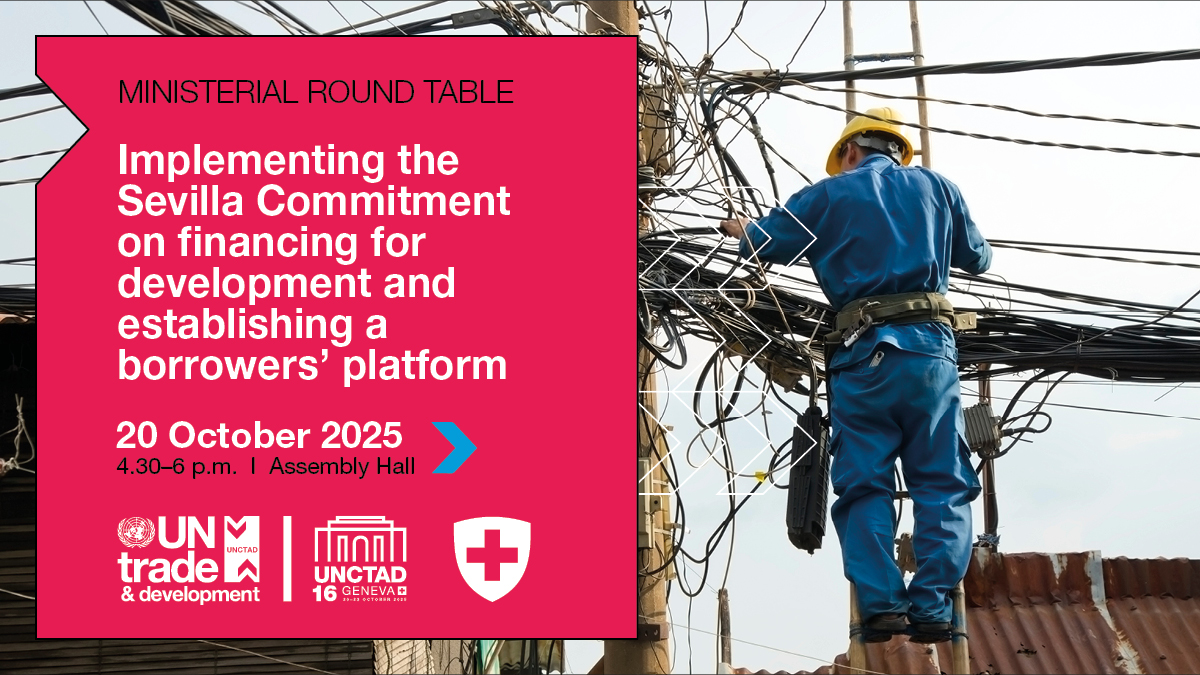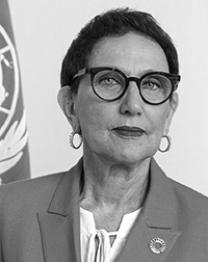
© UN Trade and Development (UNCTAD)
The Sevilla Commitment represents a comprehensive, agreed high-level agenda for the reform of the global financial architecture and mechanisms to finance sustainable development into the future. As the world deals with increasing challenges, ranging from economic instability and climate change to trade tensions and eroding multilateralism, the need to implement this commitment is more pressing than ever.
Discussions at this round table will address practical steps for progressing on and implementing the key outcomes related to debt and development finance agreed during the Fourth International Conference on Financing for Development. Discussions at the first panel will focus on the role of UNCTAD, given its expertise in financing for development research, intergovernmental consensus-building and technical assistance, in implementing the key reforms under the Sevilla Commitment. These reforms are aligned with the proposals of the United Nations Secretary-General’s Expert Group on Debt and the Africa Expert Panel of the Group of 20 established by South Africa, which holds the Group of 20 Presidency to 30 November 2025.
The establishment of a platform for borrower countries is a key agreed outcome under the Sevilla Commitment. Discussions at the second panel will address how such a platform can assist borrower countries, the modalities for establishing such a platform, criteria for membership and how the challenges faced by similar initiatives in the past may be avoided.
Programme
Opening remarks: Rebeca Grynspan, Secretary-General, UNCTAD
Panel 1: Implementing the key elements of the Sevilla Commitment related to debt and development finance
There are pronounced asymmetries in the international financial architecture that result in developing countries facing significantly higher borrowing costs than developed countries, having less favourable access to the global financial safety net and being unable to access effective debt workout mechanisms when required. The Sevilla Commitment includes agreements on several key reforms to the international debt and finance architecture that aim to address these shortcomings.
Questions
- Which agreed reforms to the global financial architecture included in the Sevilla Commitment are critical in addressing development finance challenges facing developing countries?
- What support and facilitation can UNCTAD provide towards the implementation of such outcomes?
- How can developing countries cooperate to enable better responses to debt and finance challenges?
- What can developing countries do to ensure the best financing for development outcomes?
Panel 2: Establishing a borrowers’ platform
The absence of a dedicated platform for borrower cooperation that elevates the collective voice of debtor countries, safeguards their interests and provides a repository of knowledge has long been recognized as a gap in the existing international debt and finance architecture. The Sevilla Commitment states that a platform for borrower countries will be established with support from existing institutions, and a United Nations entity serving as its secretariat.
Questions
- How can a borrowers’ platform contribute to more sustainable debt and development finance?
- What are the key challenges in establishing a borrowers’ platform and how can they be effectively addressed?
- What kind of support should the United Nations provide for a borrowers’ platform?
- What is the role of creditor countries and institutions in supporting the establishment and institutional continuity of a borrowers’ platform?
- What is required to move the initiative forward?
Moderator: To be determined
Format: Davos-style
Rebeca Grynspan, of Costa Rica, became UNCTAD's eighth Secretary-General on 13 September 2021 and is the first woman to lead the organization.
Prior to her UNCTAD appointment, she was the Ibero-American secretary-general from 2014 to 2021, also the first woman to head the organization. During her mandate, she has coordinated the 22-member Iberoamerican Conference and led four key summits of Heads of State and Government.
In 2010 she was appointed Under-Secretary-General of the United Nations and Associate Administrator of the United Nations Development Program (UNDP) and prior to that was UNDP Regional Director for Latin America and the Caribbean.
Prior to joining the United Nations, Ms. Grynspan served as Vice-President of Costa Rica from 1994 to 1998. She was also Minister of Housing, Minister Coordinator of Economic and Social Affairs, and Deputy Minister of Finance. In 2021 she was named Special International Advisor to the newly created Economic and Social Council of Argentina and invited to join as member of the G20 High-Level Independent Panel on Financing the Global Commons for Pandemic Preparedness and Response.
In addition to her experience as a lecturer and advisor to several international organizations, she has been actively involved in key United Nations initiatives, such as the Millennium Project's Task Force on Poverty and Economic Development and the High-level Panel on Financing for Development.
In 2014 and 2015, she was recognized as one of the 50 leading intellectuals of Latin America. And she was recognized as one of the 100 most powerful women in Central America by Forbes magazine.
Ms Grynspan holds a degree in Economics by the University of Costa Rica and a MSc in Economics by the University of Sussex. She has been awarded a Doctorate Honoris Causa by the University of Salamanca, the University of Extremadura and the European University of Madrid in recognition of her outstanding professional achievements.



